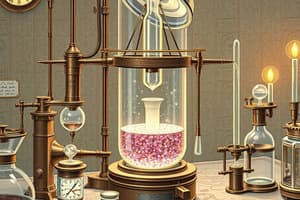Podcast
Questions and Answers
What is the maximum angular speed of a microcentrifuge?
What is the maximum angular speed of a microcentrifuge?
- 12,000–13,000 rpm (correct)
- 70,000 rpm
- 65,000 rpm
- 30,000 rpm
What type of centrifuge is best for isolating smaller biological particles like ribosomes and proteins?
What type of centrifuge is best for isolating smaller biological particles like ribosomes and proteins?
- Microcentrifuge
- Ultracentrifuge (correct)
- High-speed centrifuge
- Cold centrifuge
Which centrifuge is specifically designed to maintain low temperatures?
Which centrifuge is specifically designed to maintain low temperatures?
- Ultracentrifuge
- Cold centrifuge (correct)
- High-speed centrifuge
- Microcentrifuge
How much liquid can a high-speed centrifuge typically handle?
How much liquid can a high-speed centrifuge typically handle?
What is the maximum angular velocity achievable by ultracentrifuges?
What is the maximum angular velocity achievable by ultracentrifuges?
Which feature is unique to cold centrifuges compared to other types?
Which feature is unique to cold centrifuges compared to other types?
What is a typical volume that microcentrifuge tubes can hold?
What is a typical volume that microcentrifuge tubes can hold?
Which centrifuge can reach speeds over 65,000 x g?
Which centrifuge can reach speeds over 65,000 x g?
What is a common application for a high-speed centrifuge?
What is a common application for a high-speed centrifuge?
Which of the following centrifuges is primarily used for high-velocity applications?
Which of the following centrifuges is primarily used for high-velocity applications?
Study Notes
Types of Centrifugal Separations
-
Differential Centrifugation: Separates particles based on size; larger particles sediment faster than smaller ones during centrifugation.
-
Used for obtaining partially pure preparations of subcellular organelles and macromolecules.
-
Resulting pellet contains a mixture from larger to smaller particles; supernatant consists of liquid plus most slowly sedimenting components.
-
Density Gradient Centrifugation: Preferred method for purifying subcellular organelles and macromolecules by creating density gradients with multiple layers of gradient media.
Types of Centrifuge
-
Microcentrifuge:
- Designed for small volumes (0.5 - 2.0 mL).
- Spun at speeds of 12,000–13,000 rpm.
-
High-speed or Superspeed Centrifuge:
- Handles larger sample volumes, from tens of milliliters to several liters.
- Achieves higher speeds, around 30,000 rpm.
-
Ultracentrifuge:
- Utilizes high centrifugal forces to study biological particles.
- Can isolate much smaller particles, including ribosomes and viruses, reaching speeds over 70,000 rpm.
-
Cold Centrifuge:
- Maintains low temperatures (-20°C to -40°C), ideal for sensitive analyses such as DNA, RNA, and proteins.
- Achieves speeds over 30,000 rpm, with a relative centrifugal force (RCF) exceeding 65,000 x g.
Centrifuge Functionality
- A centrifuge separates particles from solutions based on size, shape, density, viscosity, and rotor speed by applying high gravitational force.
- Denser particles sink while lighter ones rise; if densities are equal, particles remain in suspension.
- Commonly used to separate macromolecules like cells, organelles, proteins, nucleic acids (DNA, RNA), and salts.
Principle of Centrifugation
- Operates on the sedimentation principle; denser substances settle at the bottom of the tube.
- In blood centrifugation, blood cells gather at the bottom, while plasma remains at the top.
- Variables impacting centrifugal force include mass, shape, speed, and radius.
Studying That Suits You
Use AI to generate personalized quizzes and flashcards to suit your learning preferences.
Description
Learn about differential centrifugation, a method for separating particles based on size, commonly used for obtaining partially pure preparations of subcellular organelles and macromolecules.




